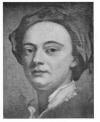Friendship, like love, is but a name,
Unless to one you stint the flame.
The child, whom many fathers share,
Hath seldom known a father's care;
'Tis thus in friendships; who depend
On many, rarely find a friend.
A hare, who, in a civil way,
Complied with ev'ry thing, like Gay,
Was known by all the bestial train,
Who haunt the wood, or graze the plain:
Her care was, never to offend,
And ev'ry creature was her friend.
As forth she went at early dawn
To taste the dew-besprinkled lawn,
Behind she hears the hunter's cries,
And from the deep-mouth'd thunder flies;
She starts, she stops, she pants for breath,
She hears the near advance of death,
She doubles, to mis-lead the hound,
And measures back her mazy round;
'Till, fainting in the public way,
Half dead with fear she gasping lay.
What transport in her bosom grew,
When first the horse appear'd in view!
"Let me," says she, "your back ascend,
And owe my safety to a friend,
You know my feet betray my flight,
To friendship ev'ry burthen's light."
The horse replied, "Poor honest puss,
It grieves my heart to see thee thus;
Be comforted, relief is near;
For all your friends are in the rear."
She next the stately bull implor'd;
And thus reply'd the mighty lord.
"Since ev'ry beast alive can tell
That I sincerely wish you well,
I may, without offence, pretend
To take the freedom of a friend;
Love calls me hence; a fav'rite cow
Expects me near yon barley mow:
And when a lady's in the case,
You know, all other things give place.
To leave you thus might seem unkind;
But see, the goat is just behind."
The goat remark'd her pulse was high,
Her languid head, her heavy eye;
"My back," says he, "may do you harm;
The sheep's at hand, and wool is warm."
The sheep was feeble, and complain'd,
His sides a load of wool sustain'd,
Said he was slow, confess'd his fears;
For hounds eat sheep as well as hares.
She now the trotting calf addrest,
To save from death a friend distrest.
"Shall I, says he, of tender age,
In this important care engage?
Older and abler pass'd you by;
How strong are those! how weak am I!
Should I presume to bear you hence,
Those friends of mine may take offence.
Excuse me then. You know my heart,
But dearest friends, alas, must part!
How shall we all lament! Adieu.
For see the hounds are just in view."
Fable L: The Hare and Many Friends
written byJohn Gay
© John Gay






